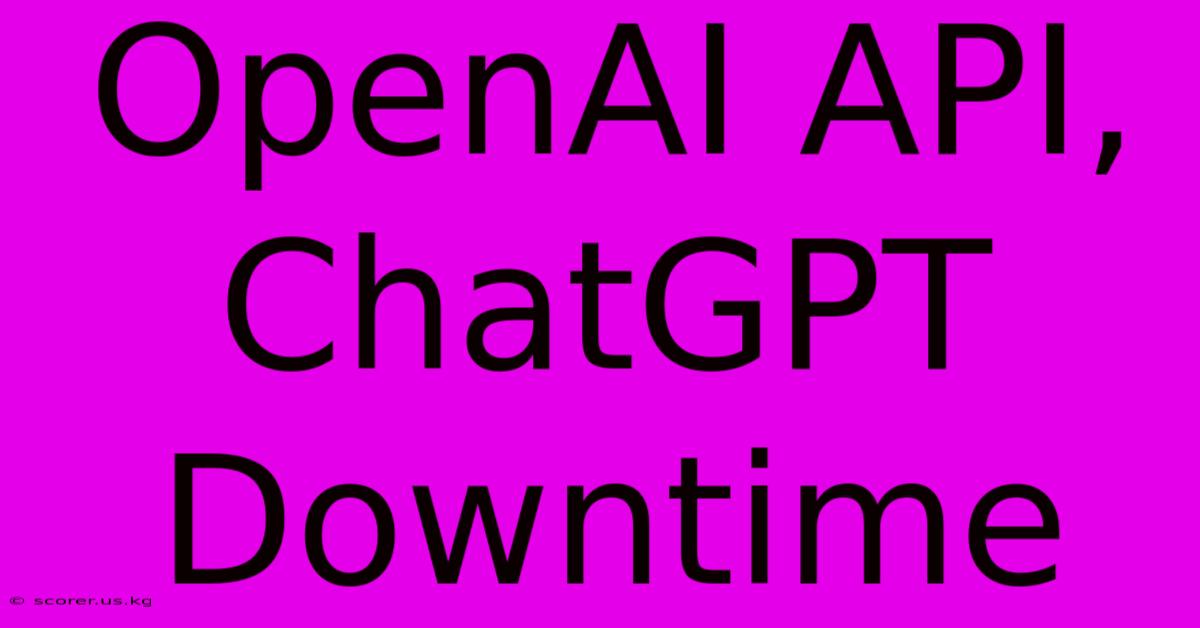OpenAI API, ChatGPT Downtime

Discover more detailed and exciting information on our website. Click the link below to start your adventure: Visit Best Website scorer.us.kg. Don't miss out!
Table of Contents
OpenAI API & ChatGPT Downtime: Understanding Outages and Ensuring Smooth Operations
The OpenAI API has revolutionized the way developers integrate AI capabilities into their applications. However, like any online service, it experiences occasional downtime, and its flagship product, ChatGPT, is not immune. Understanding the causes of these outages and implementing strategies to mitigate their impact is crucial for both developers and users.
Understanding OpenAI API Downtime
OpenAI API downtime can stem from several factors:
1. High Demand and Server Capacity:
The most common cause is simply high demand. When a large number of users or applications simultaneously access the API, it can exceed the server capacity, leading to slowdowns or complete outages. This is especially true during peak usage times or when a new feature is released. Scalability is a continuous challenge for large language models (LLMs) like those powering the OpenAI API.
2. Maintenance and Upgrades:
Scheduled maintenance and software upgrades are necessary for improving performance, security, and adding new features. During these periods, the API might be temporarily unavailable. OpenAI typically announces scheduled downtime in advance, but unexpected issues can still occur.
3. Network Issues:
Problems with OpenAI's infrastructure, including network connectivity, can also cause downtime. These issues can range from internal network problems to external disruptions affecting internet connectivity.
4. Security Incidents:
While rare, security incidents or cyberattacks can lead to temporary shutdowns to mitigate potential damage. OpenAI prioritizes security and implements robust measures to protect its infrastructure and user data.
5. Third-Party Dependencies:
The OpenAI API may rely on third-party services or software. Problems with these dependencies can indirectly impact the API's availability.
Impact of ChatGPT Downtime
ChatGPT downtime directly affects users' ability to access the conversational AI interface. This can disrupt workflows for individuals and businesses relying on ChatGPT for tasks such as:
- Content creation: Writers, marketers, and students might experience delays or interruptions in their writing processes.
- Customer service: Businesses utilizing ChatGPT for automated customer support might face disruptions in their service delivery.
- Coding assistance: Developers relying on ChatGPT for code generation or debugging might encounter productivity losses.
- Education and research: Students and researchers using ChatGPT for learning or research purposes might find their work hampered.
Mitigating the Impact of Downtime
Several strategies can help mitigate the impact of OpenAI API and ChatGPT downtime:
- Monitoring Tools: Use monitoring services to track API availability and receive alerts about outages.
- Redundancy and Failover: Implement redundant systems and failover mechanisms to ensure continued operation if the primary API becomes unavailable.
- Caching: Cache frequently accessed data to reduce reliance on the API during periods of high demand or outages.
- Error Handling: Implement robust error handling in your applications to gracefully manage API errors and inform users about temporary unavailability.
- Rate Limiting: Adhere to OpenAI's rate limits to avoid exceeding API usage quotas and potentially triggering throttling or outages.
- Alternative Solutions: Consider having backup solutions or alternative AI models ready in case of prolonged OpenAI API downtime.
Staying Informed about OpenAI API Status
OpenAI typically provides updates on API status and planned maintenance through its official website and social media channels. Staying informed about these announcements can help you anticipate and prepare for potential downtime.
In conclusion, understanding the potential causes of OpenAI API and ChatGPT downtime and proactively implementing mitigation strategies is essential for ensuring the smooth operation of applications and workflows that rely on these powerful AI tools. While outages are an inherent risk with any online service, preparedness can significantly reduce their impact.

Thank you for visiting our website wich cover about OpenAI API, ChatGPT Downtime. We hope the information provided has been useful to you. Feel free to contact us if you have any questions or need further assistance. See you next time and dont miss to bookmark.
Featured Posts
-
Wordle 1287 Clues And Solution
Dec 27, 2024
-
Draw For City Against Everton
Dec 27, 2024
-
1 1 Draw Man City Vs Everton Review
Dec 27, 2024
-
Advanced Chinese Fighter In Flight
Dec 27, 2024
-
Pitt Football Loses To Toledo
Dec 27, 2024
